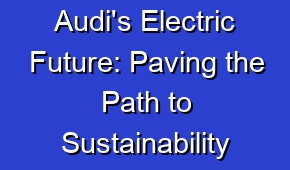Audi’s Electric Future: Paving the Path to Sustainability

Audi is paving the way towards an electric future with its innovative approach to sustainable mobility. Discover how this renowned automaker is embracing electrification and revolutionizing the automotive industry.
Audi’s path to electric future is gaining momentum as the renowned automaker embraces sustainable mobility. With a clear vision and commitment to innovation, Audi is revolutionizing the automotive industry by prioritizing the development of electric vehicles (EVs). By incorporating advanced technology and cutting-edge design, Audi is paving the way for a greener future. The company’s electric vehicle lineup showcases their dedication to reducing carbon emissions without compromising on performance or luxury. Audi’s strategic partnerships and collaborations with leading experts in the field further solidify their position as a frontrunner in the EV market. As consumers increasingly prioritize sustainability, Audi’s electric future is set to meet and exceed expectations, offering a range of eco-friendly options that cater to diverse needs and preferences. Through continuous research and development, Audi remains committed to shaping a cleaner, more sustainable tomorrow.
| Audi’s path to electric future involves a strategic shift towards sustainable mobility. |
| With the introduction of the e-tron lineup, Audi aims to lead the electric vehicle market. |
| The company plans to launch more than 20 fully electric models by 2025. |
| Audi is investing heavily in research and development to enhance electric vehicle technology. |
| The brand is committed to reducing carbon emissions and promoting eco-friendly transportation. |
- Audi’s electric future includes the development of advanced charging infrastructure.
- The company is focusing on improving battery technology for longer range and faster charging.
- Audi aims to make electric vehicles more accessible and convenient for everyday use.
- Through partnerships and collaborations, Audi is expanding its electric vehicle ecosystem.
- The transition to electric vehicles aligns with Audi’s commitment to sustainability and innovation.
What is Audi’s strategy for transitioning to electric vehicles?
Audi has developed a comprehensive strategy to transition to electric vehicles as part of its commitment to sustainable mobility. The company aims to offer more than 20 fully electric models by 2025 and has set a target of making electric vehicles account for around 40% of its total unit sales by that time. Audi’s strategy involves investing heavily in research and development, expanding its production capacity for electric vehicles, and collaborating with partners to enhance charging infrastructure.
| Investment in Electric Vehicle Technology | Expansion of Electric Vehicle Lineup | Collaboration with Charging Infrastructure Providers |
| Audi has committed to investing heavily in electric vehicle technology, including battery development and charging infrastructure. | Audi plans to expand its lineup of electric vehicles, introducing more models with improved range and performance. | Audi is collaborating with charging infrastructure providers to ensure convenient and accessible charging options for electric vehicle owners. |
| Development of Electric Vehicle Platforms | Integration of Advanced Technologies | Focus on Sustainability and Carbon Neutrality |
| Audi is developing dedicated platforms for electric vehicles, allowing for optimized design and performance. | Advanced technologies, such as autonomous driving capabilities and connected features, are being integrated into Audi’s electric vehicles. | Audi aims to achieve sustainability and carbon neutrality throughout the entire lifecycle of its electric vehicles, from production to disposal. |
What are the benefits of Audi’s electric vehicles?
Audi’s electric vehicles offer several benefits compared to traditional internal combustion engine cars. Firstly, they produce zero tailpipe emissions, reducing air pollution and contributing to improved air quality. Electric vehicles also have lower operating costs as they require less maintenance and have lower fuel costs. Additionally, Audi’s electric vehicles provide a smooth and quiet driving experience, thanks to their instant torque and refined power delivery.
- Environmentally Friendly: Audi’s electric vehicles produce zero emissions, making them a much cleaner and greener option compared to traditional gasoline-powered cars. By choosing an electric vehicle, you contribute to reducing air pollution and combating climate change.
- Lower Operating Costs: Electric vehicles are generally cheaper to operate and maintain compared to conventional cars. They have fewer moving parts, which means less maintenance and lower repair costs. Additionally, the cost of electricity for charging an electric vehicle is typically much lower than the cost of gasoline.
- Enhanced Performance: Audi’s electric vehicles offer impressive acceleration and instant torque, providing a thrilling driving experience. Electric motors deliver power more efficiently than internal combustion engines, resulting in quicker acceleration and smoother rides. Additionally, electric vehicles have a lower center of gravity, improving their handling and stability on the road.
How does Audi plan to expand its charging infrastructure?
Audi recognizes the importance of a robust charging infrastructure to support the widespread adoption of electric vehicles. The company is working on expanding its network of charging stations, both at dealerships and in public areas. Audi is also collaborating with other automakers, energy providers, and government agencies to develop fast-charging networks and ensure convenient access to charging facilities for its customers.
- Audi plans to collaborate with charging infrastructure providers to expand its network.
- The company aims to increase the number of fast-charging stations available to Audi electric vehicle owners.
- Audi intends to invest in the development of high-power charging stations to reduce charging time.
- The company plans to work with local governments and authorities to install charging stations in public areas and parking lots.
- Audi also intends to offer home-charging solutions to its customers, including the installation of charging equipment at their residences.
What is Audi’s approach to battery technology?
Audi is continuously investing in the development of advanced battery technologies to improve the range, performance, and charging capabilities of its electric vehicles. The company is focused on developing high-energy-density batteries that offer longer driving ranges and shorter charging times. Audi is also exploring solid-state battery technology, which has the potential to further enhance the efficiency and safety of electric vehicles.
| Battery Technology | Range and Performance | Charging Infrastructure |
| Audi focuses on developing advanced battery technologies for its electric vehicles. | Audi aims to provide electric vehicles with long range capabilities and high performance. | Audi is committed to expanding the charging infrastructure to support convenient and efficient charging for its electric vehicles. |
| They invest in research and development to improve battery efficiency and energy storage. | Audi’s electric vehicles offer competitive range and acceleration. | Audi collaborates with charging network providers to establish a comprehensive charging network. |
| They utilize advanced battery management systems to optimize battery performance and longevity. | Audi is continuously working on enhancing the charging speed of their electric vehicles. | Audi provides access to public charging stations and offers home charging solutions for their customers. |
How does Audi ensure the sustainability of its electric vehicles?
Audi is committed to ensuring the sustainability of its electric vehicles throughout their lifecycle. The company follows a holistic approach that includes responsible sourcing of raw materials, efficient production processes, and recycling initiatives. Audi aims to minimize the environmental impact of its electric vehicles by using renewable energy sources in production and collaborating with suppliers who adhere to strict sustainability standards.
Audi ensures the sustainability of its electric vehicles through measures such as using renewable energy sources, recycling materials, and reducing carbon emissions.
What is Audi’s timeline for phasing out internal combustion engines?
Audi has set a clear timeline for phasing out internal combustion engines. By 2026, the company plans to launch its last new model with an internal combustion engine. From that point on, Audi will focus solely on electric vehicles and gradually phase out the production of cars with traditional engines. This transition reflects Audi’s commitment to sustainable mobility and aligns with global efforts to reduce greenhouse gas emissions.
Audi aims to phase out internal combustion engines by 2033, transitioning to electric vehicles (EVs) as part of their sustainability goals.
What are the challenges in Audi’s path to an electric future?
While Audi is dedicated to its electric future, there are several challenges that need to be addressed. One of the main challenges is the development of a comprehensive charging infrastructure that can support the growing number of electric vehicles on the road. Additionally, battery technology still needs advancements to improve range and charging times further. Audi is actively working on these challenges and collaborating with various stakeholders to overcome them and accelerate the adoption of electric vehicles.
1. Charging Infrastructure
One of the major challenges in Audi’s path to an electric future is the lack of sufficient charging infrastructure. Electric vehicles (EVs) require a network of charging stations to enable long-distance travel and provide convenient charging options for owners. However, the current infrastructure is still inadequate, with limited charging stations available in many areas. This poses a challenge for Audi as they aim to increase the adoption of their electric vehicles and ensure that their customers have easy access to charging facilities wherever they go.
2. Range Anxiety
Range anxiety refers to the fear or concern of running out of battery power before reaching a charging station. Despite advancements in battery technology, the limited range of electric vehicles compared to traditional internal combustion engine vehicles is still a concern for many potential buyers. Audi needs to address this challenge by continuously improving the range of their electric models and educating consumers about the capabilities and benefits of electric vehicles. Overcoming range anxiety is crucial in convincing customers to switch to electric vehicles and embrace Audi’s electric future.
3. Cost and Affordability
Electric vehicles are generally more expensive than their gasoline counterparts due to the high cost of battery technology. Audi’s path to an electric future involves developing and producing electric vehicles that are not only environmentally friendly but also accessible and affordable to a wider range of customers. Lowering the cost of electric vehicles while maintaining high-quality standards and performance is a significant challenge for Audi. They need to invest in research and development, optimize production processes, and leverage economies of scale to make their electric models more cost-effective and competitive in the market.

















